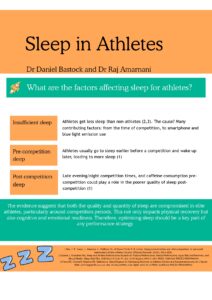Introduction
Sleep is an important part of an athlete’s health and overall functional performance. Recently, this emphasis has grown, with some teams hiring sleep coaches to optimise this as best as possible. This has meant that more emphasis is being put on the quality and quantity of sleep for athletes and how it can affect performance in recent times, with previous studies only focused on nutrition and exercise.
This blog will summarise key findings related to this topic.
Sleep disorder prevalence in athletes
Insufficient sleep in athletes has been well documented, with the average hours of sleep being 6.5 hours, compared to 7.11 hours in non-athletes across sports (1, 2). This can change, as documented by pre- and post-competition night sleep. This may be a reason for this difference; however, other reasons may be due to differences in caffeine intake, training schedules and time zone travelling for competitions (2). The use of smartphones may also disrupt sleep, with athletes posting on social media usually after training and matches (2). Further, blue light emitted from phone screens can disrupt melatonin production, leading to inadequate sleep and morning sleepiness (2).
Sleep before and after competition
There are sleep quality and length differences between nights before and after competitions for elite athletes. One study found that on nights before a competition day, athletes went to bed earlier (22:56 hr ± 49.2 min) (1), woke up later (8:12 hr ± 58.6 min), and slept for longer (7:57 hr ± 60.9 min). On nights after competition, sleep was negatively impacted across nearly all variables (Onset: 25:09 hr ± 129.9 min; Offset: 8:05 hr ± 88.2 min; Total sleep time (TST): 5:51 hr ± 107.1 min). Finally, caffeine consumption was significantly higher (2.15 ± 0.82) on competition days compared to rest days (1.95 ± 0.71) and training days (2.02 ± 0.70) (3).
There may be numerous reasons for this discrepancy, with one of the main factors causing this being the late evening/nighttime competition timings. This causes raised adrenaline and cortisol production, as well as muscle soreness and pain, leading to decreased sleep quality (3). The psychological aspect of performing later in the day and then thinking about performance and how they could have improved can also play a role in sleep quality. (1,3)
The data for the pre-competition sleep might be attributed to the athlete’s own awareness and knowledge of the importance of sleeping well before a competition, meaning they may go to sleep earlier and engage in good sleep hygiene habits.
Post-competition sleep is typically poorer than pre-competition sleep, as previously discussed. One contributing factor may be increased caffeine consumption, often used by athletes to enhance alertness and performance – particularly when competitions are scheduled close to their usual bedtime (3). This stimulant effect, combined with the physiological and psychological arousal following competition, likely disrupts sleep quality and duration (3).
Conclusion
With growing research highlighting the important role of sleep in athletic performance and recovery, sleep is now rightly being recognised as a pillar of athlete health, alongside training and nutrition. The evidence suggests that both the quality and quantity of sleep are compromised in elite athletes, particularly around competition periods. This not only impacts physical recovery but also cognitive and emotional readiness. As such, optimising sleep should be a key part of any performance strategy. Future work should continue to explore tailored interventions, including sleep hygiene education, scheduling adjustments, and potential support from sleep coaches, to help athletes recover more effectively and perform at their peak.

Authors:
- Daniel Bastock
Foundation Year 2 Doctor
The Shrewsbury and Telford Hospital NHS Trust - Raj Amarnani
@DrRajAmar
Consultant in Musculoskeletal, Sport and Exercise Medicine – Central and North West London NHS Foundation Trust
References
- Charest J, Grandner MA. Sleep and Athletic Performance: Impacts on Physical Performance, Mental Performance, Injury Risk and Recovery, and Mental Health. Sleep Med Clin. 2020 Mar;15(1):41-57. doi: 10.1016/j.jsmc.2019.11.005. PMID: 32005349; PMCID: PMC9960533.
- Vitale KC, Owens R, Hopkins SR, Malhotra A. Sleep Hygiene for Optimizing Recovery in Athletes: Review and Recommendations. Int J Sports Med. 2019 Aug;40(8):535-543. doi: 10.1055/a-0905-3103. Epub 2019 Jul 9. PMID: 31288293; PMCID: PMC6988893.
- Sim, J. E., Leota, J., Mascaro, L., Hoffman, D., & Facer-Childs, E. R. (2023). Sleep patterns before and after competition: A real-world examination of elite athletes. Journal of Sports Sciences, 41(22), 2014–2026.